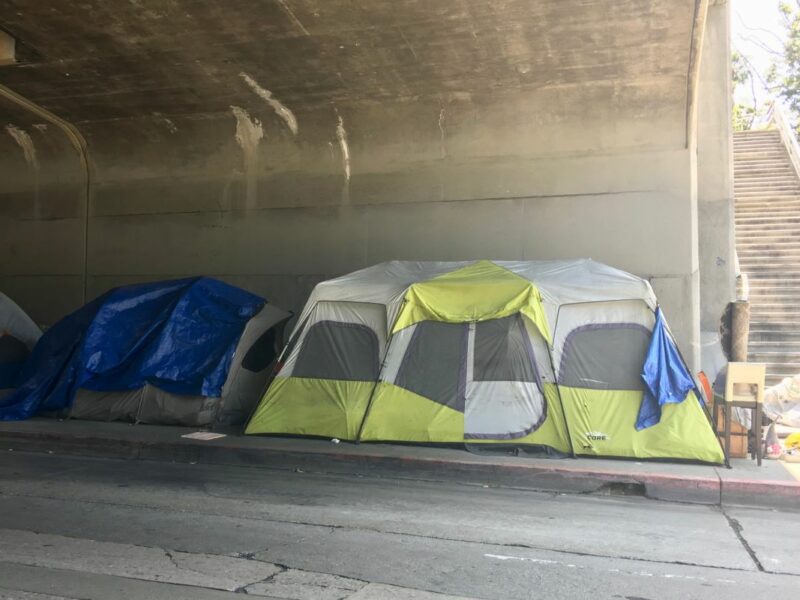First of all, this question assumes homeless people don’t already have a job. Many do, some even multiple jobs, yet they still cannot afford a home. But let’s set that aside for now.
It seems everywhere is hiring lately, from fast food joints to call centers to nonprofits. In August, there were 10.4 million job openings in the U.S. Just as there’s an abundance of jobs available, so is there an abundance of criticism for those who don’t have jobs. The criticism manifests especially among poor and homeless people. Some even view it as proof that homeless people are lazy. After all, it’s so easy to find a job these days, so why don’t they?
We’ve all seen the sarcastic, passive-aggressive signs put up by frustrated managers, which claim no one wants to work anymore. Many people blame the stimulus checks, child tax credits, or unemployment benefits. However, according to a survey conducted by SHRM of people who quit or lost their jobs during the pandemic, only 11% said expanded unemployment benefits were the reason for their joblessness. Nine percent said they were making more on unemployment than they would at a job.
The labor shortage is a much more complex issue than it seems on the surface. There are many reasons open jobs do not mean homeless people are avoiding work. It’s a tempting way to once again blame the poor for a societal problem. It’s also easy to write off people as lazy or entitled. But homeless people have always faced huge setbacks when looking for a job. These setbacks existed before the pandemic, when there were still jobs to be found, just perhaps not as many. They exist even more now.
Why is There a Labor Shortage?
To understand why the labor shortage is not an obvious solution to homelessness, we need to understand what this labor shortage really is. It quickly becomes obvious it has nothing to do with the entitlement or laziness of poverty-stricken individuals.
- Retirement. About 2.5 million people chose to retire during the pandemic. Over half of them retired early for reasons like not wanting to risk their health by going back to the office. They may have begun working remotely during the pandemic, and when asked to come back, chose to retire instead.
- Fewer immigrants are working. Visa processing delays and fewer people immigrating to the U.S. mean fewer American jobs are being worked by immigrants. There are many who want to work but can’t legally do so. Issuing of visas dropped by 4.7 million last year.
- Fewer workers are entering the market. For many years, birth rates in the U.S. have been declining. This means there are fewer workers entering the market and filling open positions. Birth rates are still dropping, so this cause of fewer workers will only get worse.
- People are sick. Many people dealing with “long-haul Covid” haven’t been able to go back to work, even months after first getting sick. A team from the Mayo Clinic estimates 1.3 million people are out of work for this reason. With symptoms like severe fatigue, pain, breathing difficulties, and brain fog, post-Covid syndrome makes it very difficult, if not impossible, to work.
We can see from these numbers that the people who previously worked these jobs just aren’t available anymore. However, you can’t simply replace them with homeless people. Some of these jobs required skilled labor, degrees, or other qualifiers that might not fit people in the homeless job pool. In many cases, having a job wouldn’t even help someone get housing due to astronomical housing costs.
Why Aren’t Homeless People Taking the Jobs?
Homeless people are just like the rest of the population with their own struggles to worry about. Getting a job while homeless requires a lot of things coming together—transportation, childcare, clean and appropriate clothing, hygiene, and more. Securing these things costs money, time, and resources that homeless people struggle to obtain. Most of the long list of reasons homeless people don’t have jobs today are the same reasons they didn’t have jobs before the pandemic.
Also, jobs don’t solve homelessness. If getting off the streets were as easy as getting a job at McDonald’s, no one would be homeless.
Other times it doesn’t make financial sense. Getting the things listed above in order is expensive. If the job doesn’t pay well, they may end up breaking even or even losing money by having a job.
Jobs Don’t Solve Homelessness
There are always plenty of open jobs that homeless people are qualified for. The problem is, those jobs don’t pay enough to get them off the streets. In some cases, having a job might force them to sleep on the streets. For example, if the shelter where a homeless person is staying has a curfew during their work shift, they have to choose between staying at work or getting to the shelter in time to get a bed.
Some fast-food restaurants are now paying $15 an hour, which seems like a lot given the federal minimum wage of $7.25 an hour. However, housing and the everyday cost of living have increased so much that higher wages don’t make much of a difference. What’s worse is inflation isn’t expected to slow down anytime soon.
Finally, it’s unfair, judgmental, and ignorant to see a homeless person and assume they refuse to work. While many have a job already – or have weighed the pros and cons and decided it doesn’t make financial sense – some homeless people simply cannot work. They may have an untreated mental illness or a physical disability that requires extensive accommodation. Some employers aren’t willing to provide those accommodations.
A job can best be understood as a protective factor for a homeless person. It may help their situation, but it doesn’t automatically solve it. It’s only one piece of the puzzle. There need to be other factors as well—chief among them, affordable housing. Without that, telling a homeless person to get a job is not only disrespectful but thoroughly misses the point.













